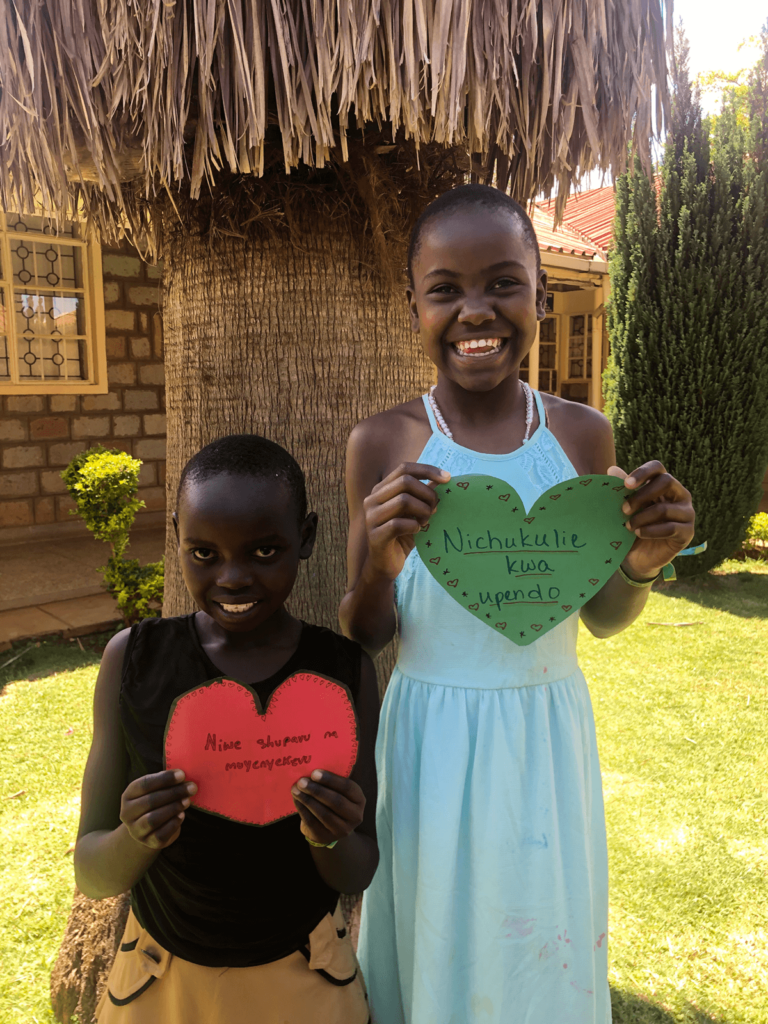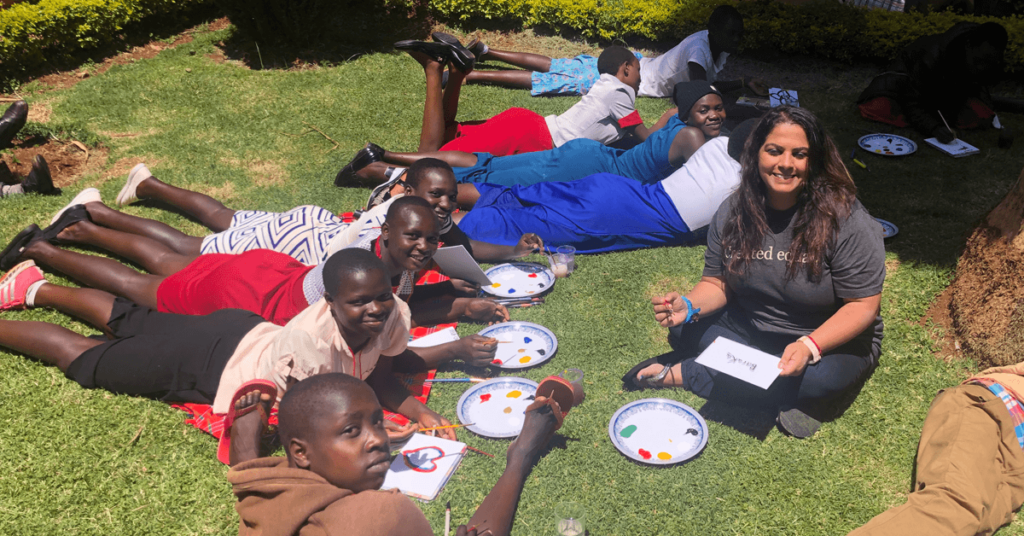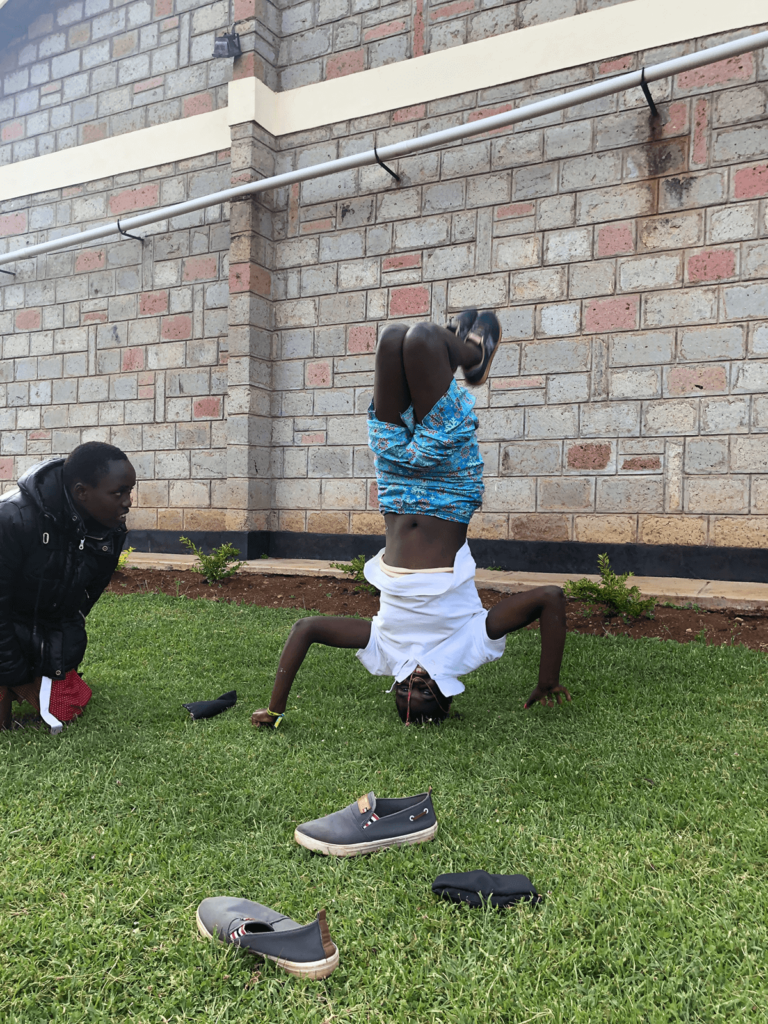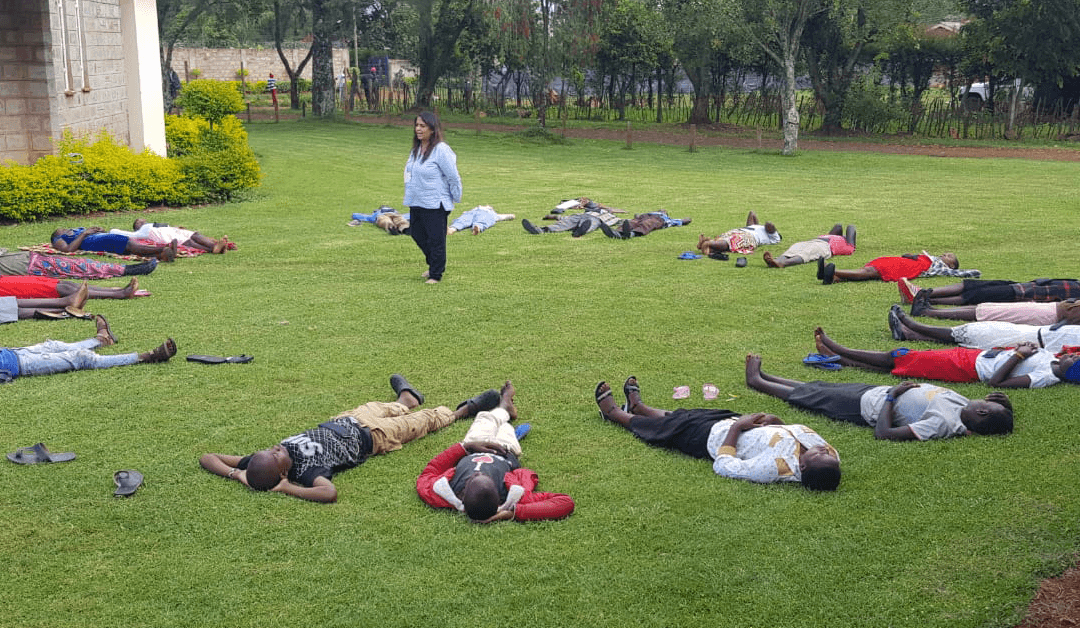A version of this article was first published through the Center for Mindful Self-Compassion’s (CMSC) newsletter.
In the coming months, CMSC will be featuring service initiatives and social-justice efforts within the CMSC community. Today, we offer a beautiful, first-person essay about a committed team of MSC teachers and their service work in Eldoret, Kenya, as part of Project Huruma. May such stories remind us of the strength of our own resilience, even during this time of global pandemic.
It is not enough to be compassionate. You must act.
Dalai Lama
Sometimes, there are atrocities that are so horrific that we can’t help but be moved to compassionate action. Such was the case in 2018 when over 300 women and children were caught in the political crossfire between warring factions in the secluded mountainous region of Chepkurkur on Mount Elgon in Kenya.
Knowing the potential of self-compassion to mitigate the deep and far-reaching symptoms of PTSD, my colleagues and I from the Project Huruma humanitarian effort helped in the way that we knew best. With the encouragement of Lilian Muthui, a Kenya-based psychologist and counselor, we set out to provide carefully adapted Mindful Self-Compassion training for the women, teens, and children of the war-torn community. The following is my journey with the beautiful people of Chepkurkur on Mount Elgon in Kenya.
At last, a school bus carrying our participants from the mountain villages pulled up on the dusty driveway in Eldoret at Saint John the Baptist Pastoral Centre where we would spend the next five days together. I ran to join the teacher processional, where we got in line to greet each of the 60+ participants personally. We were asked to do a traditional greeting of handshakes, followed by hugs to the left then the right. My heart was racing, and I was thrilled to meet our participants.
Led by Madame Chief, we all sang a Swahili welcoming song while wholeheartedly greeting each participant personally. A few of the women and children were able to put smiles on their faces as a lot of them greeted us mazunga or mgeni (non-Africans, guests), for the very first time. My heart sank and tears quickly filled my eyes as I saw the vacant looks and mechanical greetings by most of the teens and children. Many wore facial expressions of grief and trauma, some moved stiffly, all making their best efforts to cope with various forms of complex trauma. My heart broke and my stomach twisted every time I thought about what had happened to these precious souls, both recently and in the past.
In that moment, something sweet and familiar lit inside of me as I heard myself say “May I be free from suffering, may you be free from suffering. May I be held in peace and compassion, may you be held in peace and compassion.” That’s it! With every step moving forward, rhythmically I felt the words flow out of me and a warm gentle sense of calm spread throughout my being. My awareness in the moment sharpened with curiosity and an even deeper understanding of common humanity then I had ever imagined. I felt our hosts’ cracked hands in mine, looked deep into their eyes, and hugged them, heart to heart.
The Story of Lucy
There was one particular teen dressed in a soiled, torn T-shirt and blue skirt that caught my eye. She quickly turned her gaze away and sank her face into her left shoulder. The act of eye contact seemed utterly impossible. Respecting her boundary, I simply put my hand on my heart, smiled, and bowed my head down to give her permission to walk away if she wanted to. There were others who preferred no contact which was absolutely understandable in light of the horrific atrocities they had experienced. However, this particular teen caught my attention in a unique way, and I made a mental note of it.
During dinner and room assignment, I observed how she was always on the side, by choice and by what seemed to be exclusion by the other teens and women from the village. I tried to carefully engage her in dialogue and even asked our skillful translator, Zakia Rashid, to assist, but Lucy offered no words or eye contact. Compassionately respecting her boundaries, we simply made sure she had her basic needs of food, housing, hygiene, and safety met.
Next day, as our course started, Lucy sat a little outside our circle of chairs with her face often covered with a shawl donated to her by Yaffa Maritz, a teacher from the women’s MSC group. We honored her need to create privacy and further safety as my co-teachers Natacha Boulton, Natalie Logan, Peter Serete, and I taught our trauma-sensitive Making Friends with Yourself (MSC for Teens) course. Over the next few days, slowly the shawl started going down where we saw her eyes then nose. We continued to hold her in compassion, sensing that this may be what she needed. We were careful not to push her to verbally respond. In fact, we used two inanimate co-teachers, puppets, to facilitate teaching by easing the heaviness of the trauma the participants may have been experiencing. We named them “Huruma” and “Adui,” which translate in Swahili to “Compassion” and “Suffering.” Every sentence was translated into Swahili.
Huruma and Adui assisted us in aiding the teens understand concepts of mindfulness, compassion, common humanity, inner critic, judgment, and self-care. Name tags were made for all the participants and teachers, including the puppets. After every module, we went outside for “Light and Lively” which included ways of processing emotions from our body through mindful and compassionate movement.

Building trust, moving forward
As the lessons built on one another through trauma-sensitive instruction, I noticed Lucy’s shawl sat folded under her chair one day. She transitioned to using her hand to cover her mouth as she spoke a couple of words, eyes still cast down. Partway through the intensive, during one of our outdoor mindfulness exercises, she started to join our circle. She even made eye contact. I purposefully incorporated elements of nature, which is culturally relevant to their farming way of life, into self-compassion and mindfulness exercises. In between these exercises, more and more of the teens started independently engaging with me, touching my long hair as they giggled, asking me to expand further on the elements they were learning. The now-courageous teens even asked for a selfie. My heart melted as I saw the teens embody what we taught and gave themselves permission to smile and even laugh.

Stories of their daily lives and questions about my life in the U.S. started to pour out freely. However, Lucy kept turning away, breaking eye contact again. When she thought I wasn’t looking, she would stare longingly in my direction.
Saint John the Baptist Pastoral Centre had several acres of farmland, animals, rows of maize, and other vegetables. This gave us a great opportunity to practice outside in open fields, mindfully listening to cows, sheep, chicken, dogs, and even kittens. On one of our last days, we went outside for a compassion exercise using our newly sewn eye pillows with the soothing scents of lavender and bergamot. The group quickly got into a circle and comfortably lay down. I made a mental note of the level of ease Lucy found a spot beside me. She looked up at the sky, took a deep belly breath, smiled, and put the pillow above her eyes.
As I led the group through the guided meditation, I noticed the serenity of the moment and ease of the teens as they let go of their burdens and sank into mother earth with feet bare and arms resting. I noticed my own shoulders relax, chest open, breath deepen, and a sense of “this is exactly where I belong in this moment” arise.
After the meditation was over and before afternoon tea was served, we had a few minutes, so we transitioned into an impromptu mindful movement exercise which started being teacher-led but quickly moved to participant-led. This gradually moved into teens asking for a selfie as they showed me their skill at doing head stands and flips. There was laughter all around.
Then I heard a sweet gentle voice say, “Laila, selfie… Laila, selfie.” I turned around and saw Lucy, smiling. As I got my phone ready to snap a picture, Lucy went into a beautiful and strong head stand. She smiled wide then giggled as she said, “Laila, I am love.”

And my warmest appreciation to my three co-teachers (my sisters and brother of the soul) for the MSC for Teens group, Natacha Boulton, Natalie Logan, and Peter Serete. These teachers, along with the beautiful and resilient people of Kenya, will be in my heart forever.

